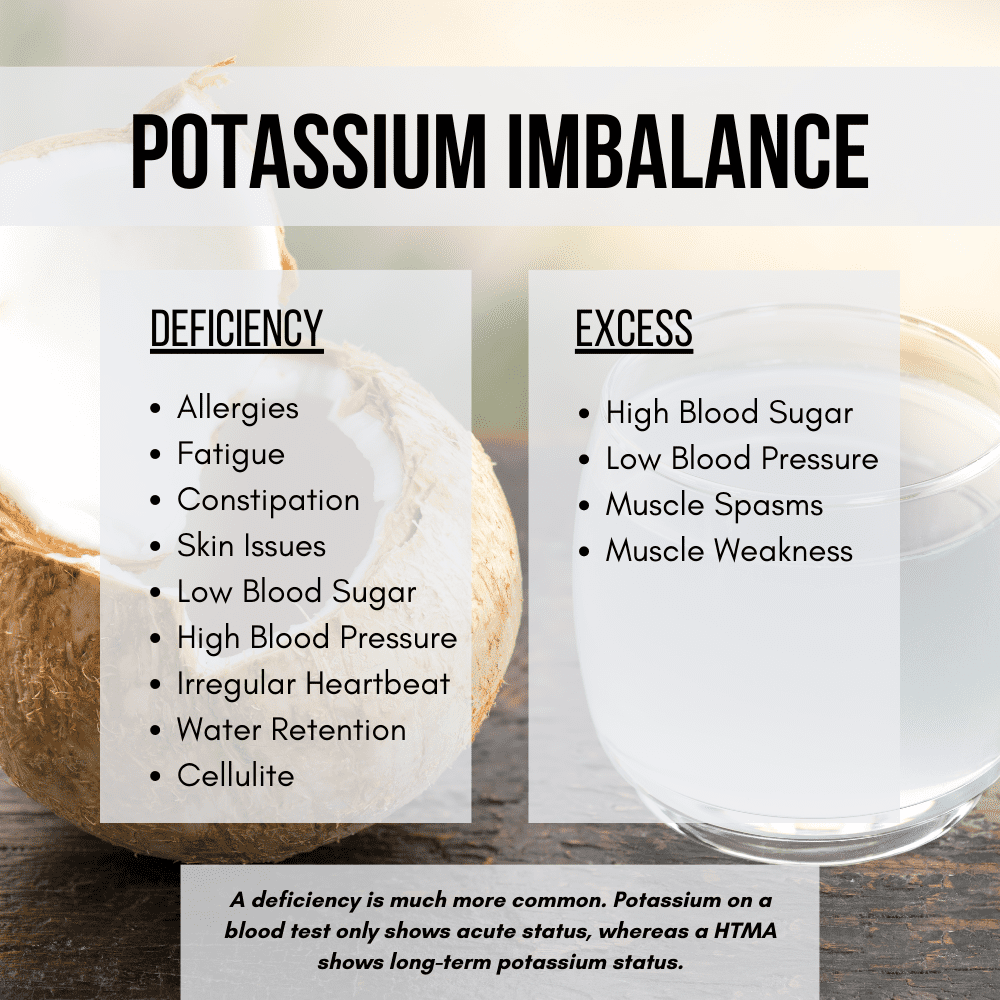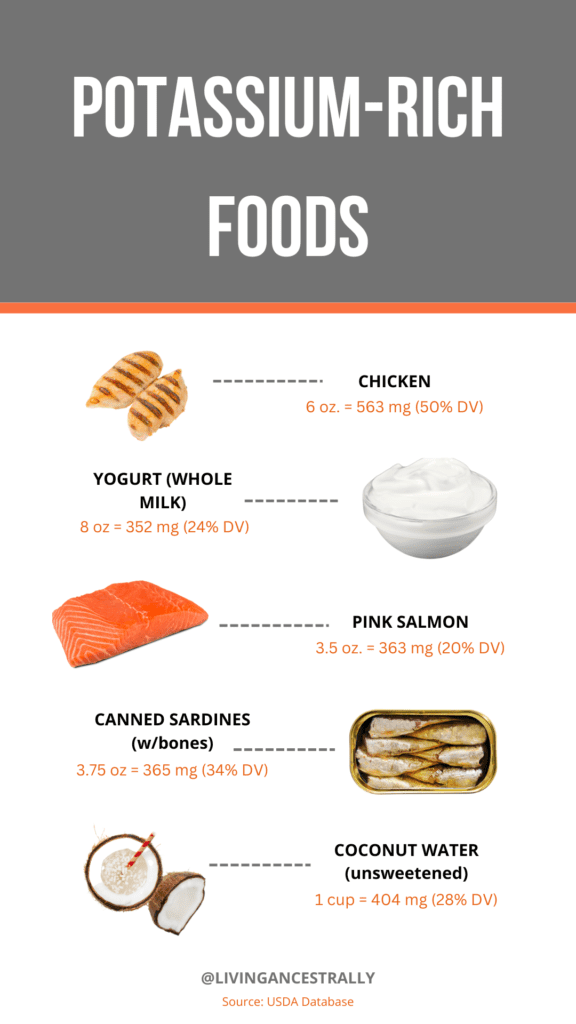Why is Potassium So Crucial?
Potassium is one of the essential minerals that our body needs to function correctly. It plays a crucial role in maintaining a healthy balance of fluids and electrolytes and helps in transmitting nerve impulses and muscle contractions. Potassium is also essential for producing energy, allowing our body to stay active and alert throughout the day. Additionally, it plays a vital role in supporting heart health by helping to regulate blood pressure and preventing cardiovascular diseases.
As a hair tissue mineral analysis (HTMA) practitioner, I’ve noticed the drastic need for more potassium. It’s often one of the first minerals that we need to start balancing.
Did you know that over 97% of people are deficient in potassium? Yep, that’s a pretty high percentage, but it’s true. Our children are included in that 97% which is pretty alarming. Particularly since a potassium deficiency can cause a whole cascade of health issues.
➠➠➠ Potassium is often the first mineral to be excreted when a mineral imbalance starts to develop.
I’ve written about magnesium quite a bit before, but I’ve realized the importance of actually looking at the actual mineral levels in the hair (and blood), and ONLY then adjusting for the different minerals based on what I see in the HTMA panel. Unless someone already knows that they don’t get enough of a certain nutrient.
I’ve found that many people feel so much better when they increase their potassium intake because it often helps the other minerals become more nicely balanced. It doesn’t solve everything for most people, but it helps.
Check out the graphic below. Notice what issues can take place when there’s a deficiency or excess of potassium.

A deficiency in potassium is actually a lot more common than an excess of potassium since most people struggle to get the recommended potassium each day.
Basically, whether you are deficient or have excess potassium, you won’t feel well. Balance is key.
How Much Potassium Should I Get Per Day?
According to the Dietary Guidelines for Americans Advisory Committees, the average adult should get 4,700 mg of potassium per day. Be sure to research what your child needs based on their age and gender.
For those that follow a lower carbohydrate diet, there are indications that less daily potassium intake is needed.
What Are the Best Forms of Supplemental Potassium?
Whole foods are always preferable since they contain other minerals, cofactors, and enzymes that you can’t get from a potassium supplement. Eating plenty of potassium-rich foods and drinks should always be the first priority when trying to get enough potassium.
I’d encourage you to focus on eating one of the potassium-rich foods in the graphic below at each of your meals. I realize that eating enough potassium can be challenging especially due to the food sensitivities or allergies that most people have nowadays. So, for some people, supplementation may be necessary if they struggle to get enough through food sources.
As far as potassium supplements go, here are the most absorbable forms:
• Potassium gluconate
• Potassium glycinate
It’s important to not consume too much potassium in the form of supplements per day. If you do, you could experience heart palpitations, slowed heart rate, and muscle weakness. If this happens to you then it’s advisable to immediately reach out to your doctor.
Potassium-Rich Foods
There are many great potassium-rich foods. I included some in the graphic below that have little-to-no plant toxins so they should work for many people.
If people want to consume dairy then I do recommend making your own raw dairy yogurt. Ultra-pasteurized dairy doesn’t have the enzyme lactase that is needed to break down the lactose (sugar in milk) which causes digestive issues for many people. Lactase gets destroyed when dairy gets heated to a certain temperature.
If you don’t have access to raw dairy or if you simply don’t want to consume raw dairy, you could try taking a digestive enzyme complex that contains lactase.

The Importance of Children Getting Enough Potassium
Mineral imbalances within kids are becoming an ever-increasing issue.
Due to all the modern toxins and stressors these days, our children’s diets have to be more thoughtfully considered than ever before in order to ensure they are getting a balance of all of the nutrients that they need.
The below suggestion about hair tissue mineral analysis (HTMA) applies to children too. Children can also easily have their levels checked. An HTMA may especially be helpful for children who have chronic behavior issues, skin rashes, cavities, sleep struggles, bed wetting, etc. Many of these issues point back to mineral imbalances and/or a heavy metal load within the body.
How To Get Enough Potassium?
➠ First, I recommend that you get a hair tissue mineral analysis(HTMA) to assess the potassium level in your body. A lot of minerals get stored in the hair which is why an HTMA is excellent for measuring most minerals.
➠➠ Secondly, you could try adding two potassium-rich foods at each meal and then adding in a potassium-rich drink in between meals.
As you’re working on increasing your potassium, you can record your intake in Cronometer (the free version) to see how much potassium you are actually getting. Then, make adjustments as necessary to get closer to the recommended 4,700 mg per day.
These same principles apply to children as well. You can research how much they need based on their age.
Here is a list of several higher-potassium foods/drinks to consider:
– Chicken
– Salmon
– Sardines
– Pork
– Turkey
– Potassium Broth
– Coconut Water
– Coconut Flakes
– Coconut Milk
– Dairy (yogurt, kefir, cheese, etc.). Raw is best, while low-temp pasteurized is second best. If you can’t find these options then make sure you take a digestive enzyme that has lactase in it to help break down the lactose in pasteurized dairy.
– Avocado (often causes issues for those with histamine food sensitivities)
– Potatoes – regular and sweet potatoes (eat in moderation because of high oxalate content)
– Stinging Nettle Tea
– Baobab Fruit Powder
– Bumbleroot Hydration Mix
– Mt. Capra Clean Minerals
Disclaimer: Always consult your healthcare practitioner before making any major changes to your diet or adding in supplements, particularly if you are on medications and/or have a chronic health condition that requires treatment.
Potassium For Better Health
The importance of getting enough potassium cannot be understated. This mineral is essential for maintaining a healthy balance of fluids in the body, which in turn affects our energy levels, metabolism, and heart health. Despite its importance, however, many people do not consume enough potassium in their diets. To ensure that we are meeting our daily recommended intake, it is important to incorporate potassium-rich foods and drinks into our meals. By doing so, we can help support our mineral levels as a whole.
Do you experience any of the symptoms mentioned in this article that may indicate a potassium imbalance? I encourage you to stay ahead of any negative health symptoms because if they don’t get addressed, health issues often spiral downward in time. Learn more about hair tissue mineral analysis (HTMA) testing and how it may benefit you.
Please note that A Hair Mineral Analysis (HTMA) is not intended to diagnose, treat, cure, reverse, or prevent any disease. It is not intended to replace any other medical test(s) that may be prescribed by your medical doctor.
